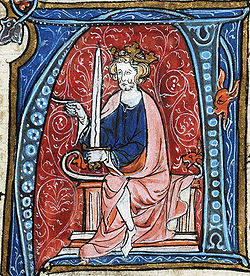 | |
| Pronunciation | English: /ˈkɒnræd/ KON-rad German: [ˈkɔnʁaːt] ⓘ |
|---|---|
| Gender | Male |
| Origin | |
| Meaning | "bold counsel" |
| Other names | |
| Related names | Konrad, Corrado (Italian) |
Conrad is a German masculine given name and a surname.
 | |
| Pronunciation | English: /ˈkɒnræd/ KON-rad German: [ˈkɔnʁaːt] ⓘ |
|---|---|
| Gender | Male |
| Origin | |
| Meaning | "bold counsel" |
| Other names | |
| Related names | Konrad, Corrado (Italian) |
Conrad is a German masculine given name and a surname.
It is derived from the Proto-Germanic name Konrad, from conja meaning "bold" and rad "counsel". [1] It was the name of a 10th-century bishop of Constance, and became popular in post-medieval English, and post-medieval French. It regained popularity in the English-speaking world in the 19th century. [1] It is recorded as a surname as early as 1297. [2]
There are over one hundred forms and spelling variants of the surname. In English, Coonrod is a variant spelling and a variant pronunciation of Conrad. [a] Variants in other languages include: [2]
| Origin | |
|---|---|
| Meaning | "bold counsel" |
| Region of origin | Germany |